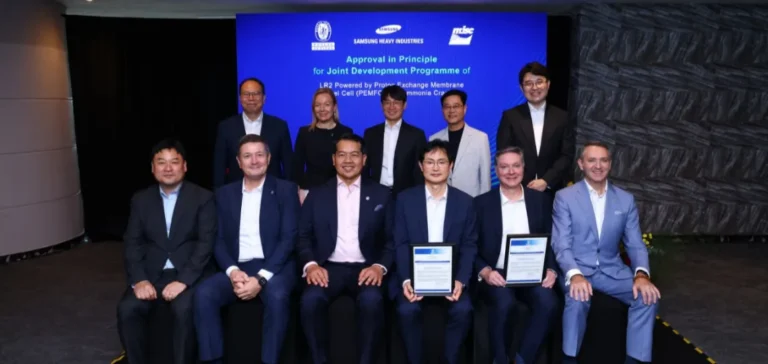VINSSEN, a South Korean company specialising in proton exchange membrane fuel cell (PEMFC) systems, has been designated as the lead technology partner for the development of a 115,000 deadweight tonne LR2 tanker, whose propulsion will be provided exclusively by a fuel cell powered by ammonia. This world first marks a significant step forward in the industrial integration of alternative propulsion technologies at scale.
The project recently passed a major regulatory milestone with the award of an Approval in Principle (AIP) by the classification society Bureau Veritas. The authorisation was granted under a Joint Development Project (JDP) involving the Malaysian group MISC Berhad and shipbuilder Samsung Heavy Industries. The AIP confirms the technical feasibility of this new generation of vessel and its compliance with international safety standards.
A 12 MW modular system to meet propulsion needs
VINSSEN has designed a modular system capable of delivering up to 12 MW from six modules of its self-developed 2 MW MEGA FC 2.0 fuel cell. This architecture allows flexible power scaling for vessels of different sizes. The system covers main propulsion, cargo handling and onboard power supply.
VINSSEN’s PEMFC technology is combined with an Ammonia Cracking System (ACS) supplied by Panasia, enabling the extraction of the hydrogen required to operate the cells. This technical combination represents a significant development compared with earlier marine fuel cell applications, historically limited to auxiliary functions or small vessels.
A regulatory framework under development
Beyond the technological challenges, the project led to the development of new safety protocols and engineering standards adapted to the use of ammonia on board. These foundations will serve as a reference for future developments in the maritime transport sector powered by alternative fuels.
According to VINSSEN, this project paves the way for large-scale integration of fuel cells in commercial shipping, with potential expansion to other vessel types. The company plans to continue the technical and commercial validations required for operational deployment in the coming years.






















